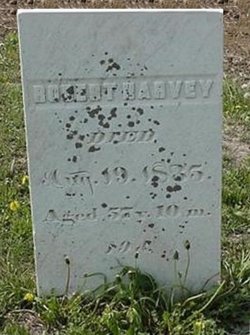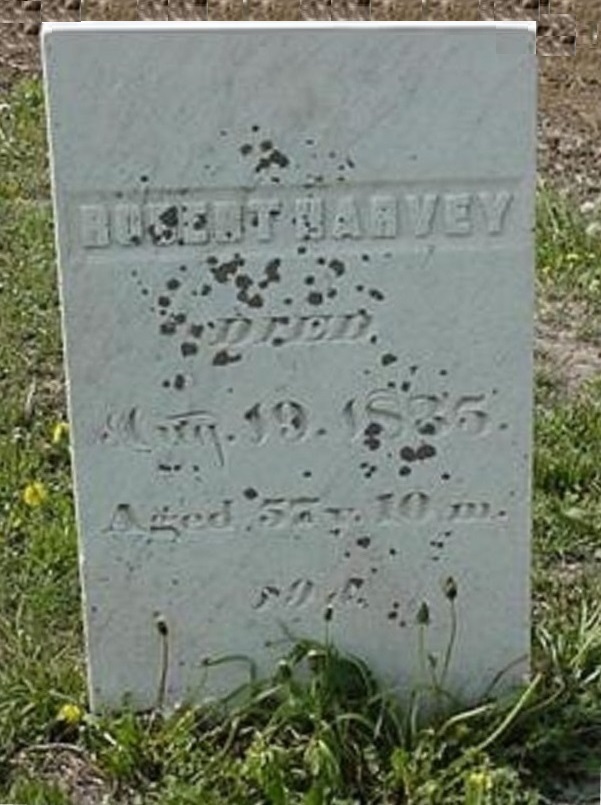PIONEER, FARMER, SOLDIER, TAVERN PROPRIETOR, POLITICIAN, ROAD SURVEYOR AND LAND OWNER
Veteran of the War of 1812 USA Ohio
Robert Harvey was the second born and eldest son of David Harvey . His mother has remained unknown. It was not Sarah Taylor. She was Davis second wife married in 1800.
David was probably born on his father's Fort Neck Plantation located in Dorchester County, Maryland on September 20, 1777. On March 25, 1795 Robert Harvey and Henrietta Ward were united in matrimony at the Great Choptank Parrish of said county.
The newly married couple set up home at Fort Neck working for his father on the plantation. Just after the turn of the century they decided to strike out for themselves. Following the Cumberland and the Old Braddock Road the young family journeyed to Wheeling, Virginia. Like many they probably built a raft and floated down the Ohio River as this was the main transportation than following the Zane Trace Road. Arriving in the region known as the Ohio Territory prior to it becoming the state of Ohio. They settled west of the Territorial Capital that would eventually becomes Ohio's first State Capital, Chillicothe. There Robert began to purchase land in Union Township, Ross County. Documents show that the family attended the first Brown Chapel Methodist Camp Meeting held in 1803. These camp meetings would become a yearly event for the region over the next thirty forty years.
In 1804 word reached the family that David Harvey had past away. Though Fort Neck encompassed nearly one thousand acres, eight hundred and fifty acres was deem to be swamp land. The Dorchester County Courts decreed that the plantation could not sustain the family and advised that the land and its holdings be sold. Robert was now the new head of his father's house hold and moved his younger brothers and sisters, except Ezekiel, to Ohio.
During the War of 1812 Robert Harvey was called upon to serve during the Summer of 1813. He was probably elected by his fellow comrades to be the Lieutenant of the regiment. Two men who were part of the company, John Quincy Adams and Edward Brown, would eventually become related by marriage.
It was more profitable to sell liquor legal rather than not. A court document has been found that Robert had to pay a fine to the courts, for producing illegal whiskey. In 1815 Robert acquired a license and opened a tavern.
The 1816 Spring elections of Union Township, Ross County saw Robert elected as a Road Supervisor. This would eventually lead to him following the trade of being a Road Surveyor in Tippecanoe County, Indiana years later.
In 1830 for his military service rendered during the War of 1812 Robert Harvey was awarded land west of where Fort Ouiatenon once stood in Shelby Township, Tippecanoe County, Indiana. With his second eldest son, John Pollard Harvey, the two set off to explore this region. Tippecanoe County was newly organized and there was now the town of Lafayette, built of logs, near by. Both men filed on additional lands at the Land Office in Chauncey, Indiana. (West Lafayette) Robert was also one of the first land owners of what was designated to become White County, Indiana, just north of Tippecanoe County.
Robert returned back to Ross County, Ohio to move his family and sell his nearly one thousand acres. The following year he was to purchase land near his sister Anna (Harvey) Brown's property in Tippecanoe Township from Samuel Alkire. He then moved his family from the northwest section, Shelby Township, to the north side, Tippecanoe Township.
The year of 1834 Robert was awarded by the Tippecanoe County Commissioners a survey for a road from La Grange, Tippecanoe County to Logansport, Cass County, Indiana. In 1838 this same road would be used by the United States Federal Government to forcefully remove the Potawatomi Native Americans from their lands in Indiana. Today this is known as the Potawatomi Trail of Death. The people stretched over a mile in length following that road.
Robert past away on August 19, 1835 having lived a fruitful and prosperous life. He was survived by His wife Henrietta Harvey, sons, David P. (Rachael) Harvey, John Pollard (Elizabeth) Harvey, Lorenzo D. Harvey, Augustine Washington (Mary) Harvey, Joseph Parnell (Mary) Harvey and daughter Eliza (Henry) Parrish. A daughter, Ann Harvey Brown preceded him in death. He was buried on the small hill beside his home in Tippecanoe Township. This land eventually became known as the Harvey Cemetery.
PIONEER, FARMER, SOLDIER, TAVERN PROPRIETOR, POLITICIAN, ROAD SURVEYOR AND LAND OWNER
Veteran of the War of 1812 USA Ohio
Robert Harvey was the second born and eldest son of David Harvey . His mother has remained unknown. It was not Sarah Taylor. She was Davis second wife married in 1800.
David was probably born on his father's Fort Neck Plantation located in Dorchester County, Maryland on September 20, 1777. On March 25, 1795 Robert Harvey and Henrietta Ward were united in matrimony at the Great Choptank Parrish of said county.
The newly married couple set up home at Fort Neck working for his father on the plantation. Just after the turn of the century they decided to strike out for themselves. Following the Cumberland and the Old Braddock Road the young family journeyed to Wheeling, Virginia. Like many they probably built a raft and floated down the Ohio River as this was the main transportation than following the Zane Trace Road. Arriving in the region known as the Ohio Territory prior to it becoming the state of Ohio. They settled west of the Territorial Capital that would eventually becomes Ohio's first State Capital, Chillicothe. There Robert began to purchase land in Union Township, Ross County. Documents show that the family attended the first Brown Chapel Methodist Camp Meeting held in 1803. These camp meetings would become a yearly event for the region over the next thirty forty years.
In 1804 word reached the family that David Harvey had past away. Though Fort Neck encompassed nearly one thousand acres, eight hundred and fifty acres was deem to be swamp land. The Dorchester County Courts decreed that the plantation could not sustain the family and advised that the land and its holdings be sold. Robert was now the new head of his father's house hold and moved his younger brothers and sisters, except Ezekiel, to Ohio.
During the War of 1812 Robert Harvey was called upon to serve during the Summer of 1813. He was probably elected by his fellow comrades to be the Lieutenant of the regiment. Two men who were part of the company, John Quincy Adams and Edward Brown, would eventually become related by marriage.
It was more profitable to sell liquor legal rather than not. A court document has been found that Robert had to pay a fine to the courts, for producing illegal whiskey. In 1815 Robert acquired a license and opened a tavern.
The 1816 Spring elections of Union Township, Ross County saw Robert elected as a Road Supervisor. This would eventually lead to him following the trade of being a Road Surveyor in Tippecanoe County, Indiana years later.
In 1830 for his military service rendered during the War of 1812 Robert Harvey was awarded land west of where Fort Ouiatenon once stood in Shelby Township, Tippecanoe County, Indiana. With his second eldest son, John Pollard Harvey, the two set off to explore this region. Tippecanoe County was newly organized and there was now the town of Lafayette, built of logs, near by. Both men filed on additional lands at the Land Office in Chauncey, Indiana. (West Lafayette) Robert was also one of the first land owners of what was designated to become White County, Indiana, just north of Tippecanoe County.
Robert returned back to Ross County, Ohio to move his family and sell his nearly one thousand acres. The following year he was to purchase land near his sister Anna (Harvey) Brown's property in Tippecanoe Township from Samuel Alkire. He then moved his family from the northwest section, Shelby Township, to the north side, Tippecanoe Township.
The year of 1834 Robert was awarded by the Tippecanoe County Commissioners a survey for a road from La Grange, Tippecanoe County to Logansport, Cass County, Indiana. In 1838 this same road would be used by the United States Federal Government to forcefully remove the Potawatomi Native Americans from their lands in Indiana. Today this is known as the Potawatomi Trail of Death. The people stretched over a mile in length following that road.
Robert past away on August 19, 1835 having lived a fruitful and prosperous life. He was survived by His wife Henrietta Harvey, sons, David P. (Rachael) Harvey, John Pollard (Elizabeth) Harvey, Lorenzo D. Harvey, Augustine Washington (Mary) Harvey, Joseph Parnell (Mary) Harvey and daughter Eliza (Henry) Parrish. A daughter, Ann Harvey Brown preceded him in death. He was buried on the small hill beside his home in Tippecanoe Township. This land eventually became known as the Harvey Cemetery.
Inscription
ROBERT HARVEY
DIED
AUG. 19, 1835
AGE 57y. 10m.
29d.
Family Members
Advertisement
Explore more
Sponsored by Ancestry
Advertisement






